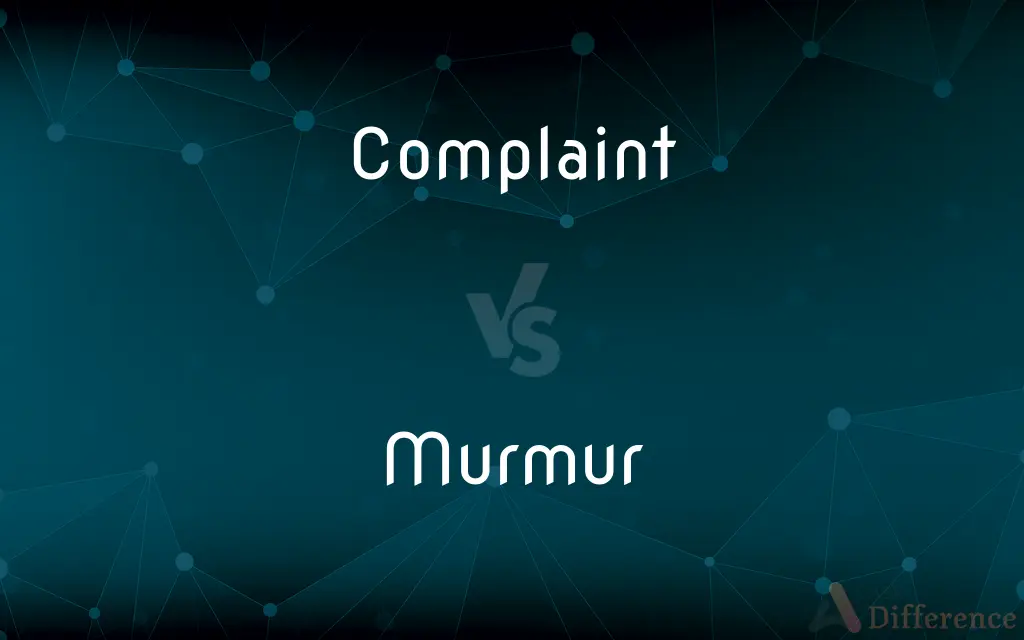Complaint vs. Murmur — What's the Difference?
By Fiza Rafique & Urooj Arif — Updated on May 7, 2024
A complaint is a formal expression of dissatisfaction or grievance, typically directed at a specific issue, while a murmur is a soft, indistinct sound often used to convey discontent or agreement in a quiet, subdued manner.

Difference Between Complaint and Murmur
Table of Contents
ADVERTISEMENT
Key Differences
A complaint is explicitly articulated to express displeasure or an issue with a service, product, or situation, often expecting resolution or acknowledgment. On the other hand, a murmur can be an expression of general discontent or approval but is conveyed subtly, without the explicit intent of seeking resolution.
Complaints are usually direct and clear in their purpose, made in a context where the complainer seeks change or remediation. Whereas, murmurs are more about conveying a mood or a soft spoken sentiment, often heard in crowds or among groups as a sign of agreement or disapproval.
The process of complaining often involves specific channels or protocols, such as customer service departments or formal complaint forms. In contrast, murmuring is informal and spontaneous, lacking a structured avenue for expression.
In terms of impact, a complaint aims to initiate action or a response from the recipient, playing a critical role in customer service and quality control. Murmurs, however, serve more as a background expression of sentiment, influencing the atmosphere or collective feeling rather than eliciting a direct response.
While complaints are a fundamental tool for addressing issues in professional and public settings, murmurs are typically reserved for personal expression in social or casual environments, reflecting a group's underlying mood or consensus.
ADVERTISEMENT
Comparison Chart
Definition
Formal expression of dissatisfaction
Soft, indistinct sound conveying sentiment
Intent
Seeks resolution or change
Expresses mood or agreement subtly
Communication
Direct and clear
Subtle and indirect
Channels
Formal protocols (e.g., complaint forms)
Informal and spontaneous
Impact
Initiates action/response
Influences atmosphere or collective mood
Compare with Definitions
Complaint
Call for improvement.
The customer’s complaint led to changes in the company’s policy.
Murmur
Low utterance.
The room was filled with murmurs during the tense discussion.
Complaint
Report of misconduct.
The official complaint against the officer led to an investigation.
Murmur
Indistinct sound.
The murmur of the brook added to the tranquility of the scene.
Complaint
Expression of dissatisfaction.
Her complaint about the noise was addressed by the hotel management.
Murmur
Soft spoken agreement.
A murmur of approval swept through the crowd as the decision was announced.
Complaint
Demand for action.
The letter of complaint requested a full refund for the service.
Murmur
Quiet discontent.
Murmurs of discontent emerged among the staff after the announcement.
Complaint
Formal grievance.
He filed a complaint with customer service about the defective product.
Murmur
Subdued expression.
There was a gentle murmur of excitement in the audience.
Complaint
In legal terminology, a complaint is any formal legal document that sets out the facts and legal reasons (see: cause of action) that the filing party or parties (the plaintiff(s)) believes are sufficient to support a claim against the party or parties against whom the claim is brought (the defendant(s)) that entitles the plaintiff(s) to a remedy (either money damages or injunctive relief). For example, the Federal Rules of Civil Procedure (FRCP) that govern civil litigation in United States courts provide that a civil action is commenced with the filing or service of a pleading called a complaint.
Murmur
A low, indistinct, continuous sound
Spoke in a murmur.
The murmur of the waves.
Complaint
An expression of pain, dissatisfaction, or resentment.
Murmur
An indistinct, whispered, or confidential complaint; a mutter.
Complaint
A cause or reason for complaining; a grievance
What is your complaint?.
Murmur
(Medicine) An abnormal sound, usually emanating from the heart, that sometimes indicates a diseased condition.
Complaint
A bodily disorder or disease; a malady or ailment.
Murmur
To make a low, continuous, indistinct sound or succession of sounds.
Complaint
The symptom or distress about which a patient seeks medical assistance.
Murmur
To complain in low mumbling tones; grumble.
Complaint
A formal statement initiating a lawsuit by specifying the facts and legal grounds for the relief sought.
Murmur
To say in a low indistinct voice; utter indistinctly
Murmured his approval.
Complaint
A formal charge, made under oath, of the commission of a crime or other such offense.
Murmur
Any low, indistinct sound, like that of running water.
Complaint
The act of complaining.
Murmur
Soft indistinct speech.
A murmur arose from the audience.
Complaint
A grievance, problem, difficulty, or concern.
I have no complaints about the quality of his work, but I don't enjoy his company.
Murmur
The sound made by any condition which produces noisy, or turbulent, flow of blood through the heart.
Complaint
(legal) In a civil action, the first pleading of the plaintiff setting out the facts on which the claim is based;
The purpose is to give notice to the adversary of the nature and basis of the claim asserted.
The purpose is to give notice to the adversary of the nature and basis of the claim asserted.
Murmur
A muttered complaint or protest; the expression of dissatisfaction in a low muttering voice; any expression of complaint or discontent.
Complaint
(legal) In criminal law, the preliminary charge or accusation made by one person against another to the appropriate court or officer, usually a magistrate.
However, court proceedings, such as a trial, cannot be instituted until an indictment or information has been handed down against the defendant.
However, court proceedings, such as a trial, cannot be instituted until an indictment or information has been handed down against the defendant.
Murmur
To grumble; to complain in a low, muttering voice, or express discontent at or against someone or something.
Complaint
A bodily disorder or disease; the symptom of such a disorder.
Don't come too close; I've got this nasty complaint.
Murmur
(intransitive) To speak or make low, indistinguishable noise; to mumble, mutter.
I couldn't hear the words; he just murmured a lot.
The bees murmured in the forest. The waves murmured on the shore.
Complaint
Expression of grief, regret, pain, censure, or resentment; lamentation; murmuring; accusation; fault-finding.
I poured out my complaint before him.
Grievous complaints of you.
Murmur
(transitive) To say (something) indistinctly, to mutter.
Complaint
Cause or subject of complaint or murmuring.
The poverty of the clergy in England hath been the complaint of all who wish well to the church.
Murmur
A low, confused, and indistinct sound, like that of running water.
Complaint
An ailment or disease of the body.
One in a complaint of his bowels.
Murmur
A complaint half suppressed, or uttered in a low, muttering voice.
Some discontents there are, some idle murmurs.
Complaint
A formal allegation or charge against a party made or presented to the appropriate court or officer, as for a wrong done or a crime committed (in the latter case, generally under oath); an information; accusation; the initial bill in proceedings in equity.
Murmur
To make a low continued noise, like the hum of bees, a stream of water, distant waves, or the wind in a forest.
They murmured as doth a swarm of bees.
Complaint
An often persistent bodily disorder or disease; a cause for complaining
Murmur
To utter complaints in a low, half-articulated voice; to feel or express dissatisfaction or discontent; to grumble; - often with at or against.
And all the children of Israel murmured against Moses and against Aaron.
Neither murmur ye, as some of them also murmured.
Complaint
(formerly) a loud cry (or repeated cries) of pain or rage or sorrow
Murmur
To utter or give forth in low or indistinct words or sounds; as, to murmur tales.
The people murmured such things concerning him.
Complaint
An expression of grievance or resentment
Murmur
A low continuous indistinct sound; often accompanied by movement of the lips without the production of articulate speech
Complaint
(civil law) the first pleading of the plaintiff setting out the facts on which the claim for relief is based
Murmur
A schwa that is incidental to the pronunciation of a consonant
Complaint
(criminal law) a pleading describing some wrong or offense;
He was arrested on a charge of larceny
Murmur
An abnormal sound of the heart; sometimes a sign of abnormal function of the heart valves
Murmur
A complaint uttered in a low and indistinct tone
Murmur
Speak softly or indistinctly;
She murmured softly to the baby in her arms
Murmur
Make complaining remarks or noises under one's breath;
She grumbles when she feels overworked
Common Curiosities
Are murmurs significant in decision-making?
They can indicate the general sentiment of a group, influencing leaders subtly.
What is the main difference between a complaint and a murmur?
A complaint is a formal grievance seeking resolution, while a murmur is an informal expression of sentiment.
How should organizations respond to complaints?
By addressing the issues raised and striving to improve the situation.
Can murmurs escalate into complaints?
Yes, if the underlying issues represented by murmurs are not addressed.
What typically prompts a complaint?
Unmet expectations or dissatisfaction with a service or product.
How do complaints benefit a business?
They provide feedback for improvement and help in maintaining customer satisfaction.
Can murmurs be positive?
Yes, they can express agreement or approval in a subdued manner.
Why might someone choose to murmur rather than speak openly?
Due to the desire to avoid conflict or because the setting does not encourage open expression.
What are effective ways to handle complaints?
Prompt response, active listening, and constructive resolution strategies.
How can leaders use murmurs to their advantage?
By gauging the mood or consensus of a group and adjusting strategies accordingly.
Share Your Discovery

Previous Comparison
Convey vs. Inform
Next Comparison
Compensation vs. ClaimAuthor Spotlight
Written by
Fiza RafiqueFiza Rafique is a skilled content writer at AskDifference.com, where she meticulously refines and enhances written pieces. Drawing from her vast editorial expertise, Fiza ensures clarity, accuracy, and precision in every article. Passionate about language, she continually seeks to elevate the quality of content for readers worldwide.
Co-written by
Urooj ArifUrooj is a skilled content writer at Ask Difference, known for her exceptional ability to simplify complex topics into engaging and informative content. With a passion for research and a flair for clear, concise writing, she consistently delivers articles that resonate with our diverse audience.
















































